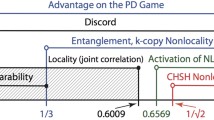Abstract
We present a quantum solution to coordination problems that can be implemented with existing technologies. Using the properties of entangled states, this quantum mechanism allows participants to rapidly find suitable correlated choices as an alternative to conventional approaches relying on explicit communication, prior commitment or trusted third parties. Unlike prior proposals for quantum games our approach retains the same choices as in the classical game and instead utilizes quantum entanglement as an extra resource to aid the participants in their choices.
Similar content being viewed by others
REFERENCES
E. Adar and B. A. Huberman, A market for secrets. First Monday 6, 6-16 (2001).
R. J. Aumann, Subjectivity and correlation in randomized strategies. J. Math. Econ., 1, 67-96 (1974).
S. C. Benjamin and P. M. Hayden, Multiplayer quantum games. Phys. Rev. A, 64, 030301 (2001).
K. Binmore and L. Samuelson. Coordinated action in the electronic mail game. Games Econ. Behav. 35, 6-30 (2000).
C. Camerer, Behavioral Game Theory: Experiments on Strategic Interaction (Princeton University Press, Princeton, NJ, 2003).
K.-Y. Chen, Tad Hogg, and Raymond Beausoleil, A quantum treatment of public goods economics. Quant. Inform. Process. 1, 449-469 (2002). arxiv.org preprint quantph/ 0301013.
J. Du et al., Experimental realization of quantum games on a quantum computer. Phys. Rev. Lett. 88, 137902 (2002) arxiv.org preprint quant-ph/0104087.
J. Eisert, M. Wilkens, and M. Lewenstein, Quantum games and quantum strategies. Phys. Rev. Lett. 83, 3077-3080 (1999). arxiv.org preprint quant-ph/9806088.
D. Fudenberg and J. Tirole, Game Theory (MIT Press, Cambridge, MA, 2000).
J. van Huyck, R. Battalio, and F. Rankin, On the origin of convention: Evidence from coordination games. Econ. J. 107, 576-597 (1997).
P. G. Kwiat et al., Experimental verification of decoherence-free subspaces. Science 290, 498-501 (2000).
C. F. Lee and N. Johnson, Quantum game theory. arxiv.org preprint quant-ph/0207012, 2002.
S. Lloyd, M. S. Shahriar, and P. R. Hemmer, Teleportation and the quantum internet. Technical report, MIT, 2004.
D. A. Meyer, Quantum strategies. Phys. Rev. Lett. 82, 1052-1055 (1999). arxiv.org preprint quant-ph/9804010.
P. la Mura, Correlated equilibria of classical strategic games with quantum signals. arxiv.org preprint quant-ph/0309033, Sept. 2003.
M. A. Nielsen and Isaac L. Chuang, Quantum Computation and Quantum Information. (Cambridge University Press, 2000).
A. Rubinstein, The electronic mail game: Strategic behavior under almost common knowledge. Am. Econ. Rev., 79, 385-391 (1989).
C. A. Sackett, D. Kielpinski, B. E. King, C. Langer, V. Meyer, C. J. Myatt, M. Rowe, Q. A. Turchett, W. M. Itano, D. J. Wineland, and C. Monroe. Experimental entanglement of four particles. Nature, 404: 256-259 (2000).
T. C. Schelling, The Strategy of Conflict (Oxford University Press, Oxford, 1960).
S. J. van Enk and R. Pike. Classical rules in quantum games. Phys. Rev. A 66: 024306 (2002).
Author information
Authors and Affiliations
Rights and permissions
About this article
Cite this article
Huberman, B.A., Hogg, T. Quantum Solution of Coordination Problems. Quantum Information Processing 2, 421–432 (2003). https://doi.org/10.1023/B:QINP.0000042201.34328.61
Issue Date:
DOI: https://doi.org/10.1023/B:QINP.0000042201.34328.61




